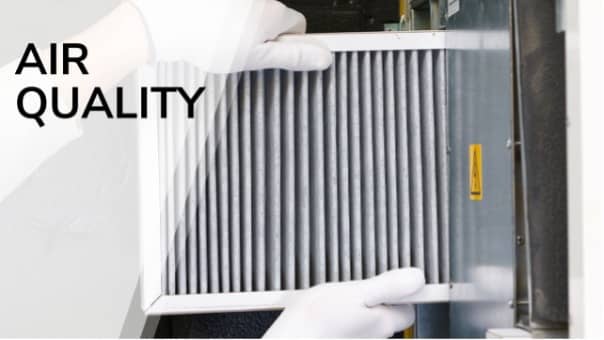
Maintaining optimal indoor air quality (IAQ) is fundamental for ensuring a healthy, comfortable, and safe living environment. Poor IAQ can lead to various health issues, including allergies, respiratory problems, and general discomfort. Regular monitoring and maintenance of indoor air are crucial for improving air quality and overall well-being. This comprehensive guide delves into the role of air filters, their types, the benefits of reusable filters, and essential factors to consider for maintaining excellent IAQ.
Understanding Indoor Air Quality (IAQ)
Indoor Air Quality (IAQ) refers to the condition of the air inside your home and its impact on health and comfort. Several factors contribute to IAQ, including:
- Ventilation: Proper ventilation is essential for ensuring that fresh outdoor air circulates through your home, reducing the concentration of indoor pollutants. Without adequate ventilation, pollutants can accumulate and degrade air quality.
- Humidity: Humidity levels significantly influence IAQ. High humidity can foster mold and mildew growth, while low humidity can cause respiratory issues and dry skin. Maintaining humidity levels between 30% and 50% helps to prevent these problems.
- Contaminants: Common indoor pollutants include dust, mold spores, pet dander, volatile organic compounds (VOCs) from household products, and smoke. These contaminants can originate from various sources, including furniture, cleaning products, and cooking.
- Indoor Plants: While indoor plants can improve air quality by absorbing CO2 and releasing oxygen, overwatering can lead to mold growth. Select plants that are known for their air-purifying qualities and ensure proper maintenance.
Evaluating and Improving Indoor Air Quality
To effectively monitor and improve IAQ, consider these steps:
- Air Pollutant Monitoring: Invest in air quality sensors that can detect various pollutants such as dust, VOCs, and carbon dioxide. These sensors provide real-time data and can help you identify areas in your home that may require attention. High pollutant levels may necessitate additional cleaning or air purification measures.
- Regular Humidity Checks: Use a hygrometer to monitor humidity levels in different areas of your home. If humidity levels are consistently outside the ideal range, consider using a dehumidifier or humidifier to adjust the levels accordingly.
- Inspect for Moisture Issues: Routinely check areas prone to dampness, such as basements, bathrooms, and around windows. Address any leaks or water damage promptly to prevent mold growth and its associated health risks.
- Ventilation Practices: Enhance ventilation by using exhaust fans in high-moisture areas, such as kitchens and bathrooms. Open windows when weather permits to allow fresh air to circulate. Consider installing an air exchange system if your home has limited natural ventilation.
- Frequent Cleaning: Regular cleaning helps reduce dust, allergens, and other contaminants. Vacuum carpets and upholstery using a vacuum with a HEPA filter to capture fine particles. Dust surfaces with a damp cloth to prevent dust from becoming airborne.
The Role of Air Filters in Enhancing Air Quality
Air filters are a critical component of HVAC systems, designed to capture airborne particles and improve indoor air quality. Here’s a closer look at their role and how to select the best filter for your needs:
- How Air Filters Work: Air filters trap particles such as dust, pollen, and smoke as air passes through them. By capturing these particles, filters prevent them from circulating through your home and contributing to poor air quality.
- Filter Types and Benefits:
- Pleated Air Filters: These filters are known for their efficiency and capacity to trap particles. They have a larger surface area compared to flat filters, which enhances their performance. Pleated filters are suitable for general air filtration needs and are commonly used in residential settings.
- HEPA Air Filters: HEPA (High-Efficiency Particulate Air) filters offer superior filtration by capturing particles as small as 0.3 microns with 99.97% efficiency. They are ideal for environments where high air quality is essential, such as homes with allergy sufferers or respiratory conditions.
- Electrostatic Air Filters: Electrostatic filters use an electrostatic charge to attract and hold particles. They are highly effective and can often be cleaned and reused. This type of filter can be a cost-effective and environmentally friendly option if properly maintained.
- Choosing the Right Air Filter:
- MERV Rating: The Minimum Efficiency Reporting Value (MERV) measures a filter’s ability to capture airborne particles. Filters with higher MERV ratings offer better filtration. For most residential applications, a MERV rating between 8 and 12 is typically sufficient. Higher MERV ratings are suitable for more demanding air purification needs.
- Filter Size and Fit: Ensure that the air filter you select is the correct size for your HVAC system. An improperly sized filter can reduce efficiency and potentially damage the system. Always refer to your HVAC system’s specifications when choosing a filter.
- Replacement Frequency: Regular maintenance is key to optimal filter performance. Inspect your air filter monthly and replace it according to the manufacturer’s recommendations. A clogged or dirty filter can obstruct airflow and place extra strain on your HVAC system.
- Reusable vs. Disposable Filters:
- Reusable Filters: Reusable filters, such as electrostatic filters, can be cleaned and used multiple times. They are more environmentally friendly and can offer long-term cost savings. However, they require regular maintenance to ensure continued effectiveness. Proper cleaning and care are essential to prevent the buildup of contaminants.
- Disposable Filters: Disposable filters are convenient and require less maintenance compared to reusable options. They are replaced periodically based on the manufacturer’s guidelines. While they may incur ongoing costs, they provide a hassle-free solution for maintaining air quality.
Additional Tips for Enhancing Indoor Air Quality
- Use Air Purifiers: In addition to air filters, consider using standalone air purifiers in rooms where air quality is a concern. Air purifiers equipped with HEPA filters can provide an extra layer of filtration and help reduce specific pollutants.
- Control Sources of Pollution: Reduce or eliminate sources of indoor pollution by choosing low-VOC paints and cleaning products, avoiding smoking indoors, and using natural cleaning methods. Keeping pollutants out of your home is as important as filtering the air.
- Regular HVAC Maintenance: Schedule regular maintenance for your HVAC system to ensure it operates efficiently. Professional maintenance can help identify potential issues and keep your system running smoothly.
- Educate Your Household: Make sure everyone in your household understands the importance of maintaining good air quality and how to contribute. Encourage practices like removing shoes indoors, avoiding aerosol sprays, and using exhaust fans.
Conclusion
A healthy living environment depends on evaluating and enhancing indoor air quality. Maintain appropriate humidity levels, look for contaminants, and make sure your house has enough ventilation to keep an eye on the quality of the air. In order to increase air purity and catch airborne particles, air filters like the 16x25x4 air filter size are crucial to this process.
Think about your top concerns, including budget, maintenance preferences, and the influence on the environment, while deciding between washable and disposable filters. While they provide a viable and perhaps economical option, washable air filters need to be maintained on a regular basis. You may maintain a healthy indoor environment and take pleasure in cleaner air in your house by being aware of these issues and acting pro-actively.
Advertise with the mоѕt vіѕіtеd nеwѕ ѕіtе іn Antigua!
We offer fully customizable and flexible digital marketing packages.
Contact us at [email protected]















